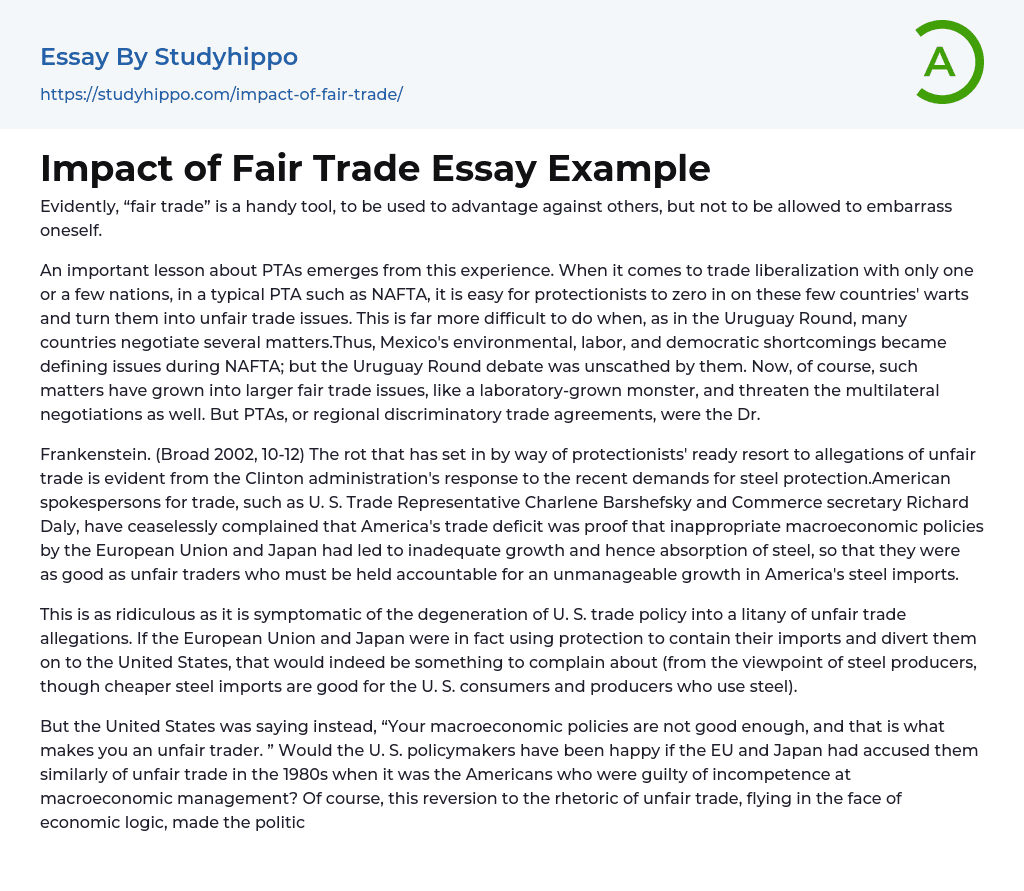Evidently, “fair trade” is a handy tool, to be used to advantage against others, but not to be allowed to embarrass oneself.
An important lesson about PTAs emerges from this experience. When it comes to trade liberalization with only one or a few nations, in a typical PTA such as NAFTA, it is easy for protectionists to zero in on these few countries' warts and turn them into unfair trade issues. This is far more difficult to do when, as in the Uruguay Round, many countries negotiate several matters.Thus, Mexico's environmental, labor, and democratic shortcomings became defining issues during NAFTA; but the Uruguay Round debate was unscathed by them. Now, of course, such matters have grown into larger fair trade issues, like a laboratory-grown monster, and threaten the multilateral negotiations as well. But PTAs, or regional discriminatory trade agreement
...s, were the Dr.
Frankenstein. (Broad 2002, 10-12) The rot that has set in by way of protectionists' ready resort to allegations of unfair trade is evident from the Clinton administration's response to the recent demands for steel protection.American spokespersons for trade, such as U. S. Trade Representative Charlene Barshefsky and Commerce secretary Richard Daly, have ceaselessly complained that America's trade deficit was proof that inappropriate macroeconomic policies by the European Union and Japan had led to inadequate growth and hence absorption of steel, so that they were as good as unfair traders who must be held accountable for an unmanageable growth in America's steel imports.
This is as ridiculous as it is symptomatic of the degeneration of U. S. trade policy into a litany of unfair trade allegations. If the European Union and Japan were in fac
using protection to contain their imports and divert them on to the United States, that would indeed be something to complain about (from the viewpoint of steel producers, though cheaper steel imports are good for the U. S. consumers and producers who use steel).
But the United States was saying instead, “Your macroeconomic policies are not good enough, and that is what makes you an unfair trader. ” Would the U. S. policymakers have been happy if the EU and Japan had accused them similarly of unfair trade in the 1980s when it was the Americans who were guilty of incompetence at macroeconomic management? Of course, this reversion to the rhetoric of unfair trade, flying in the face of economic logic, made the politics of both demanding and supplying protection to the ailing steel industry a lot easier.
And so in the United States far too many politicians today have turned into an unfair-trade-obsessed, cynically manipulative lot. Broadly, with a few shining exceptions—such as the former senator Daniel Patrick Moynihan among the Democrats and Senator Phil Gramm, a former professor of economics, among the Republicans—they divide into two groups: the less disagreeable ones whose slogan is “free and fair trade,” and the more disagreeable ones who insist on “fair trade before free trade.” I might cite also the former president, who not merely fed the fair trade mania over Japan, but also called, in his State of the Union address in January 2000, for “a freer and fairer trading system for twenty-first century America. ” The plain consequence is that the ceaseless refrain in favor of free trade by American politicians has nurtured an electorate that thinks
of the United States as a fair trader and others, in varying degrees, as unfair traders.The effect of this public perception, in turn, has been to encourage the thought in the country that free trade is both economically unwise and politically naive. And so, to the litany of hostile sentiments that come at free trade for reasons.
I must add this unfortunate legacy of sloppy surrender by politicians to the rhetoric of fair trade. A surrender to this dangerous rhetoric is particularly evident when one turns to the fair trade arguments that relate to differences in (domestic-pollution-related) environmental and labor standards across countries.It has thus become routine to charge unfair trade when firms in foreign countries have lower environmental and labor standards because (a) they are then regarded as indulging in “social dumping” that needs to be countervailed by a tariff; and (b) it is feared that such differences in standards will trigger a “race to the bottom” that will undermine one's own higher standards. Demands for fair trade are then made on these foreign nations, asking them to raise their standards towards ours. Neither argument, however, is compelling. (Brown 1993, 5-6)
- Culture essays
- Social Control essays
- Citizenship essays
- Social Justice essays
- Caste System essays
- Social Responsibility essays
- Socialization essays
- Deviance essays
- Modern Society essays
- Popularity essays
- Civil Society essays
- Community essays
- Female essays
- Filipino People essays
- Igbo People essays
- Indigenous Australians essays
- Indigenous Peoples essays
- Minority Group essays
- Social Institution essays
- Men essays
- The nation essays
- Middle Class essays
- Social Norms essays
- Discourse Community essays
- Popular Culture essays
- Car Culture essays
- American Culture essays
- Mormon essays
- Indian Culture essays
- Mexican Culture essays
- Pop Culture essays
- Cultural Differences essays
- Culture Shock essays
- Different Cultures essays
- Profession essays
- Labour Economics essays
- Occupational Safety And Health essays
- Pension essays
- Salary essays
- Strike Action essays
- Wage essays
- Career essays
- Workplace essays
- Homeless essays
- Working Together essays
- Career Path essays
- Hunter essays
- Farmer essays
- Nurse essays
- Pilot essays




